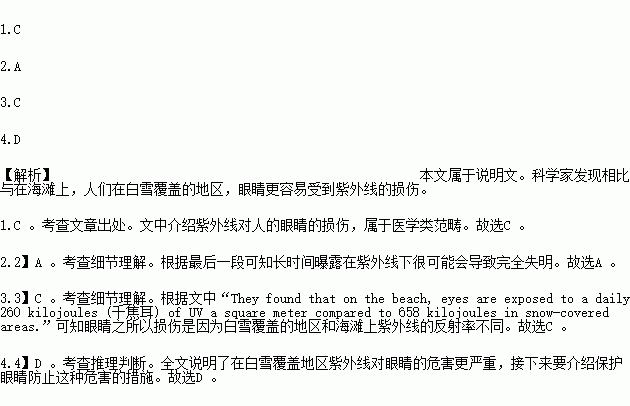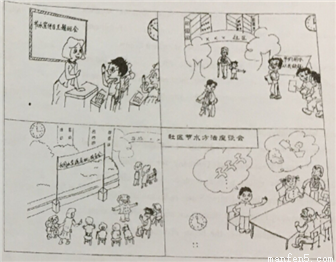题目内容
【四川省成都市第七中学2017届高三二诊】D
Scientists have found that human eyes are more likely to be damaged by UV rays while skiing in the snow-covered areas than sitting on the beach, according to a report by the UK newspaper.
The researchers at Kanazawa Medical University, Japan and American company Johnson & Johnson conducted the study together. They looked at the effects of light reflection on newly fallen snow on a ski trail in Ishikawa District, northern Japan. They compared the results with the levels of UV rays on a sand beach in southern Japan's Okinawa District.
They found that on the beach, eyes are exposed to a daily 260 kilojoules (千焦耳) of UV a square meter compared to 658 kilojoules in snow-covered areas.
The findings are supported by the Japan Meteorological (气象的) Agency. According to the agency, the reflection rate of UV light on beaches is often between 10 and 25 percent, compared to 80 percent in the new snow areas. The amount of light increased 4 percent with a 300-meter rise in height.
Most of us know that UV rays can harm the skin. That's why we wear sunscreen on our skin before we get out in the sun. But many of us may not realize that UV rays are also harmful to the eyes.
If your eyes are exposed to large amounts of UV radiation over a short period of time, you may experience a kind of sunburn of the eye, which is harmful. Your eyes will become red and feel a strange feeling. They may be sensitive to light. Fortunately, this is usually temporary and seldom causes permanent damage to the eyes.
Long-term exposure to UV radiation, however, can be more serious. Scientific studies and researches have shown that exposure to small amounts of UV radiation over a period of many years increases the chance of eye damage, which could lead to total blindness.
1.You would most likely find the article in .
A. a doctor's diary B. a travel journal
C. a medical magazine D. a physics textbook
2.Which of the following statements is TRUE according to the passage?
A. Too much eye exposure to UV rays may cause total blindness.
B. Short-time exposure of the eyes to UV rays doesn't harm them at all.
C. Most people know that UV rays harm the eyes as well as the skin.
D. The study was conducted by researchers from Japan, the USA and the UK.
3.Human eyes are more likely to be damaged by UV rays while skiing in the snow-covered areas than sitting on the beach because .
A. Snow produces more UV light than water.
B. People don’t wear sunscreen while skiing as they do while sitting on the beach.
C. The reflection rate of UV light in snow-covered areas is much higher than that on the beach.
D. Human eyes are exposed longer to UV light in the snow- covered areas than on the beach.
4.What will the passage most probably talk about next?
A. Never ski on newly fallen snow in Japan.
B. Go to hospital to have your eyes examined.
C. Wearing a hat can provide protection while skiing in new snow areas.
D. Take some measures to protect your eyes while skiing in new snow areas.



 continued writing. He wrote mostly about New York and the life of the poor there. People liked his stories, because simple as the tales were, they would finish with a sudden change at the end, to the reader’s surprise.
continued writing. He wrote mostly about New York and the life of the poor there. People liked his stories, because simple as the tales were, they would finish with a sudden change at the end, to the reader’s surprise.